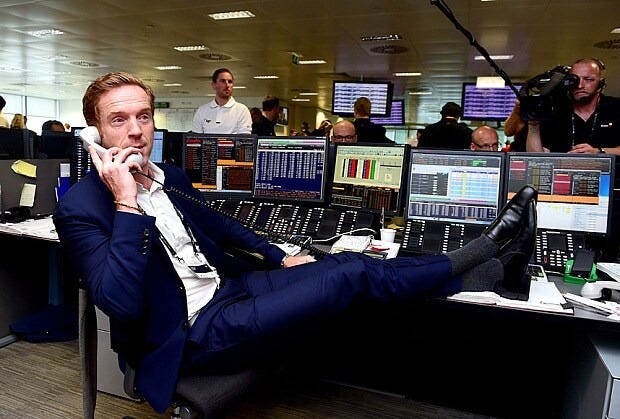Lutnick Goes to Washington
The Zero-Sum World of Interdealer Brokerage
We’ve profiled many Wall Street jobs in the four and half years Net Interest has been running: Research analysts, high frequency traders, hedge fund managers, compliance officers… In many cases we’ve broken down the economics of the role and identified how it fits into the fabric of capital markets. One function we haven’t looked at yet is interdealer broking. Retail broking and prime broking, we’ve done those, but interdealer broking is a different beast and, as you’ll see, it can be quite colorful.
This week, Howard Lutnick, the head of one of the largest firms of interdealer brokers was nominated by Donald Trump to be US Commerce Secretary. His firm, BGC Group Inc., employs 2,121 brokers in offices all over the world. There are some links between Lutnick’s views on commerce and interdealer broking – we’ll come to those – but first: What does an interdealer broker do?
Gary Stevenson spent a lot of time with brokers when he was trading foreign exchange for Citigroup in the early 2010s. He describes them in his memoir, The Trading Game:
“Their job is, technically, to make connections between traders. The traders make the deals, and the brokers just match them together… Theoretically, the brokers allow you to buy something without tipping off your opposition to the fact that you wanna buy. This can be useful if you’re a big player, like Citibank, and you wanna buy without moving the market. The theory is, if you wanna buy something at, say, 36, you tell your broker, and he starts shouting ‘36 bid 36 bid 36 bid’ down every speakerbox in the City, and hopefully he finds someone who wants to sell there. The deal can happen without anyone ever knowing that you, specifically, wanted to buy, and that’s good, because if everybody knows you’re a buyer then they might push the price up before you can buy.
That’s the theory though. What’s the reality? Well the reality … is they do broker lunches.”
In this age of electronic markets, broker lunches may seem like a throwback to a bygone era. And it’s not just lunches – Stevenson describes other hospitality. “Brokers mine you for vices,” he writes. “They fill you right up with whatever you need.”
But in more complex, less liquid markets, the human touch still adds value. As well as providing anonymity and discretion, human brokers offer market intelligence that traders continue to find useful. They can search the market for the best executable price which may not be available on electronic platforms; they can find the other side for particular sized lots, preventing the need for larger trades to be parceled up and drip-fed to the market; and in cases where products have multiple elements which need to be transacted simultaneously, brokers can step in to help.
While some markets trade predominantly via machine – Barclays estimates that 70% of European and US government bond volumes are now traded electronically – many still rely on old-fashioned human interaction. In fixed income, Barclays calculates that only 30% of US high-yield and 41% of European high-yield trade electronically. Although increasing, the firm’s head of thematic fixed income research reckons that it will be difficult to push electronic volumes beyond around 80% given particular characteristics of bond markets: requirements for banks to commit capital, the need to customize trades, and an entrenched community of bond trading relationships that becomes particularly important when markets are chaotic.
And that’s just fixed income. In rates (where Gary Stevenson worked), interest rate derivatives, energy and commodities markets, customers have different reasons to prefer voice over machines. Some interdealer brokers, including BGC Group, offer electronic functionality too, so that clients can choose. A full-service offering allows Howard Lutnick to describe his business as “an exchange for everything in the world that doesn’t trade on an exchange”. But voice remains core. In the first nine months of this year, 78% of the firm’s brokerage revenue derived from voice/hybrid.
Howard Lutnick’s personal story is well known: An orphan at 18, he then lost his brother and best friend to 9/11 along with most of the New-York based staff of his firm.1 Trump highlighted it in the press release that accompanied his appointment. The story of his company, less so. To dig in more, and to see how his background running an interdealer broker may inform his thinking as Commerce Secretary, read on.

